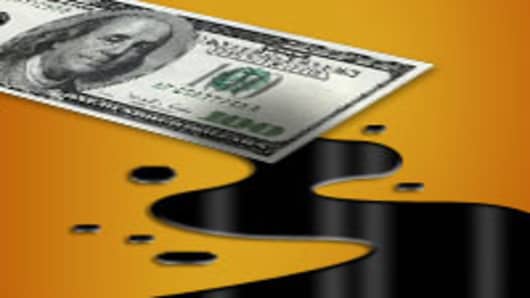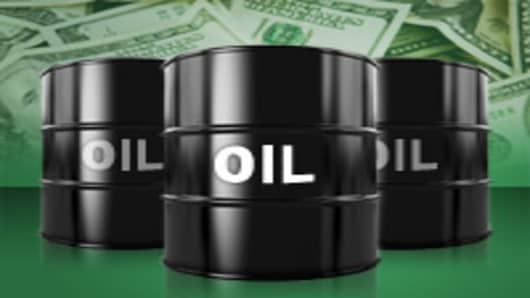Oil prices have jumped more than 70% since February on expectations of an improving economy, but traders say crude isn't likely to head back up to $100 a barrel anytime soon.
A year ago, oil was barreling towards a staggering $147, which translated into $4 a gallon at the gas pump. But when the financial crisis sent the economy reeling last fall, oil plummeted below $35 a barrel.
Since the low of $33.55 in February, US light, sweet crude has followed stocks in rallying on hopes of economic recovery. The price retreated a bit on Monday, but on Friday traded up $1.92 to settle at $58.63 a barrel, another high for the year.
Even so, traders don't see oil rising much beyond $70 a barrel. They argue that with the economy posting only tepid signs of recovery, the dollar holding fairly strong and demand remaining relatively low, there seems to be little impetus for a rise back towards last summer's record-breaking highs.
"Those levels around $60 or $65 could be attainable even though the fundamentals are bearish," says oil trader Daniel Cronin, senior commodities analyst at PitGuru. "Unless we have a real rip-roaring equity market I really don't see crude higher than $60. I don't see any kind of fundamental reason for it other than speculation like we saw last year. That's not the same game anymore."
That should mean good news for companies that spend a lot on sending their goods long distances. And that effect should transfer over to the stock market at some point.
"There's potential for pretty good profit growth for the next 18 months," says Kurt Karl, chief economist at Swiss Re. "The market will eventually feel that in a much fuller way."
Consumers, of course, are already feeling the benefits of lower gasoline and heating oil costs.
The drop in oil prices provides a saving of $160 billion to taxpayers, amounting to more than 1 percent of gross domestic product. That in turn helps consumer-based companies that benefit from more consumer spending.
Some believe the fall in energy prices to levels more accurately representing market value already has at least partly contributed to the gains in stocks.
In fact, about the only sector not likely to feel benefits is the energy production industry itself.
"That's one of the things the stock market is bullish about," says Chip Hanlon, president of Delta Global Advisors in Huntington Beach, Calif. "The reality is that this is one tax that has come down in the last year, and it's an important one."
The effect should be felt even further once investors get confidence that the worst of the banking crisis has passed.
"Right now we're in that uncertainty area if we're going to come out of this or if we're going to have another leg down from employment cuts or some other banking issue," Karl says.
Swiss Re is maintaining its forecast of oil to waffle between $40 and $50 a barrel, though prices lately have broken out of that range and moved past what some traders had consdered a key resistance level of $55.
Speculators who were running from the stock market and chasing a falling dollar and surging demand during peak driving season helped push oil to its $147 record last summer. Since then, those traders have gotten pushed out of the markets as the dollar has stiffened against the euro and the commodities markets have changed.
"A lot of them just got blown out. Some of them don't exist anymore," says Darin Newsom, commodities analyst at DTN on Omaha, Neb. "Also, there are some commodities out there that are more attractive."
As oil prices rose in 2008, demand grew louder for alternative fuels like ethanol. That in turn gave rise to demand for the corn used to make ethanol, sending that crop's prices soaring. Since then, though, the moves in oil have dampened enthusiasm for ethanol and corn, and traders in the agricultural markets have now turned their focus to soybeans.
All of that has caused a normalization of oil trading patterns. Where during last year's rise oil prices jumped as the stock market dropped, the two now are moving more closely. Indeed, the stock market rally of the past two months and some signs of economic improvement have been accompanied by oil moving off its lows around $35 a barrel.
Not all companies, though, benefit from the fall in oil prices.
In earnings reported last Tuesday, Archer Daniels Midland said its quarterly profit tumbled 98 percent primarily due to falling demand for ethanol-related products due to the falling price of oil.
Chesapeake Energy reported similar weakness in its earnings, including an impairment charge of $6.11 billion due to the declining value of its natural gas and oil properties.
Separately, Standard & Poor's said the economies of 19 global oil producers were vulnerable to the drop in prices, providing a scare for investors betting on certain emerging markets. Still, the Organization of Petroleum Exporting Countries has avoided a hard line when dealing with defending oil's price, as the group is mindful of the weakness of consumers around the globe.
Prices at the pump are unlikely to exceed about $2.35 for a gallon of regular unleaded, Newsom says.




